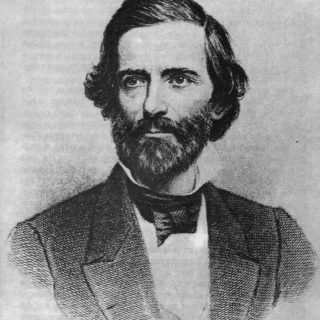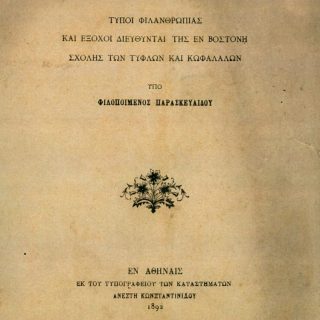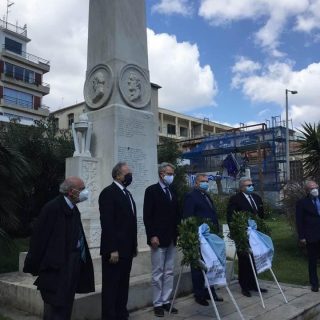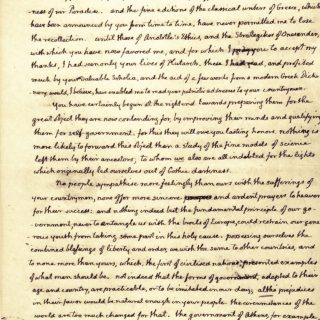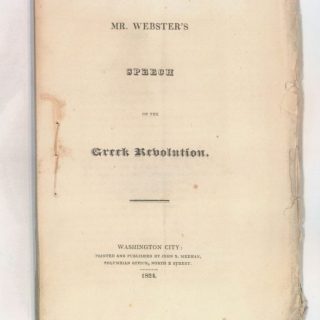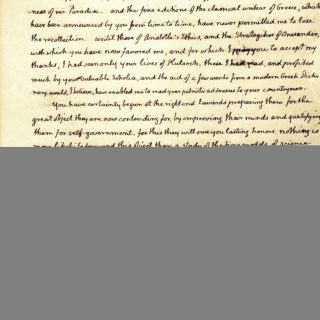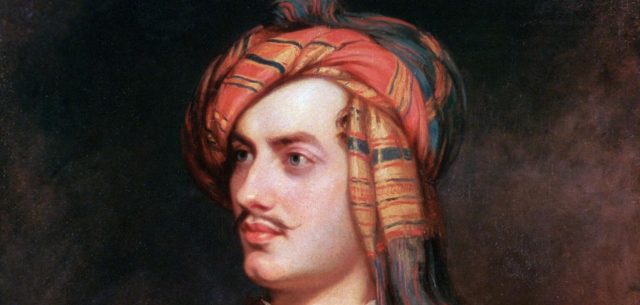Greece and the U.S: Celebrating a 200 Year Friendship
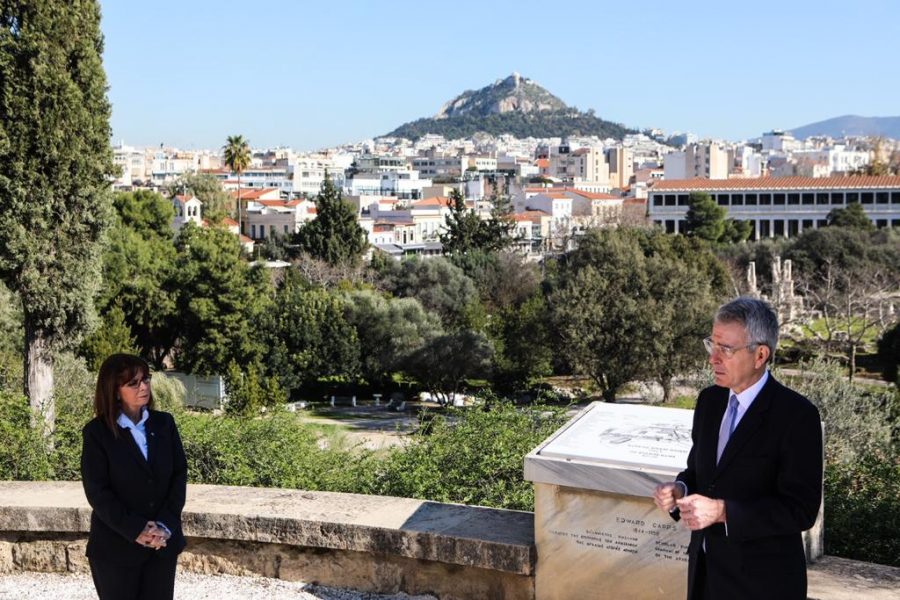
To honour Greece’s bicentennial anniversary, the U.S. Mission to Greece launches “USA & Greece: Celebrating 200 Years of Friendship,” which highlights the role of American Philhellenes in the Greek Revolution and the bonds of mutual respect and shared values that unite both nations. Greece’s struggle for independence, based on the same democratic ideals that inspired the American Revolution, motivated early Americans to rally behind the Greek cause, providing humanitarian aid and fighting alongside their Greek comrades in arms. US Ambassador Geoffrey Pyatt highlights the special relationship that binds the United States and Greece, tracing it back to the intertwining histories of both nations.
Earlier this year, U.S. Ambassador to Greece Geoffrey Pyatt announced the launch of U.S. Mission Greece’s year-long campaign to commemorate Greece’s Bicentennial entitled “USA & Greece: Celebrating 200 Years of Friendship.” The campaign will include educational and cultural events across Greece that will highlight our two countries’ historic relationship and the ties that bind us: democracy, partnership, and shared values.
Two hundred years later, our people-to-people ties are stronger than ever, and our countries are working closely together to promote regional peace, stability, and prosperity. Greece’s bicentennial is an opportunity for the United States to partner with Greek civil society, cultural and educational institutions, cities, and individual citizens throughout the year to reaffirm our respect for ancient Athenian democracy, celebrate our historic friendship, and chart an agenda for our shared future.
Ambassador Pyatt’s announcement followed the launch of the “Greece 2021” Committee’s campaign to commemorate this landmark anniversary of 200 years since the Greek Revolution of 1821, with programs to celebrate Greece’s history, honor its people, highlight its achievements, and envision its future.
To honor Greece’s bicentennial and complement the Greece 2021 Committee’s schedule of events, the U.S. Mission to Greece has launched a campaign called “USA & Greece: Celebrating 200 Years of Friendship,” which highlights the role of American Philhellenes in the Greek Revolution and the bonds of mutual respect and shared values that unite our peoples. Greece’s struggle for independence, based on the same democratic ideals that inspired the American Revolution, motivated early Americans to rally behind the Greek cause, providing humanitarian aid and fighting alongside their Greek comrades in arms. It will also celebrate the strong people-to-people ties between the U.S. and Greece over the last 200 years, and our commitment to our present-day strategic partnership.
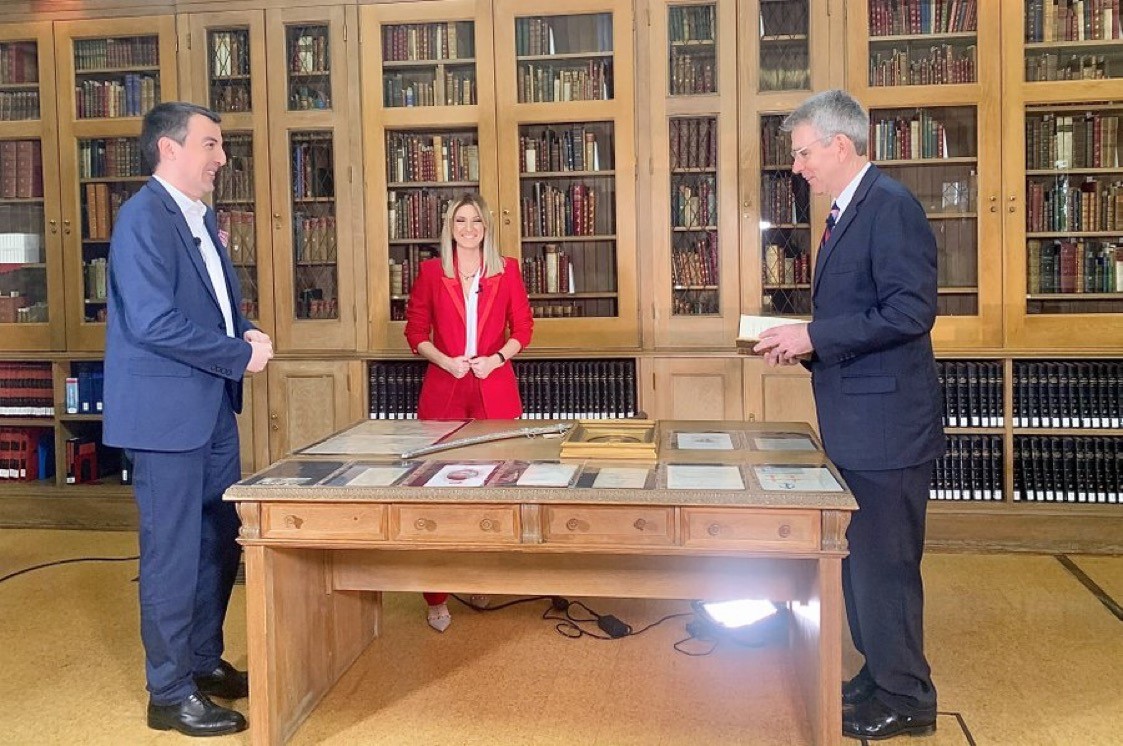
Ambassador Pyatt at an Interview with ERT announcing USA-Greece Celebrating 200 Years of Friendship Campaign
Speaking about the campaign, Ambassador Pyatt said, “U.S.-Greek relations are the best they’ve been in modern history. Our friendship began during Greece’s war for independence and Greece’s 2021 bicentennial is an opportunity to celebrate this history and the values of liberty and democracy our peoples have defended for over 200 years.”
To honor this important milestone, the US Mission in Greece has launched a campaign inspired by the Greek concept of philia, highlighting the historic relationship between our countries and the strong foundation of democratic values that we share. I have learned over the past four years that Greek philia is not to be taken lightly. As Aristotle stated, true philia is a form of love rooted in honor, commitment, and respect for each other.
Excerpts from Ambassador Pyatt’s interview on ERT.
On the American interest in the Greek cause for freedom and statehood in the early 1800s.
I think one of the things that really distinguishes the relationship between Greece and the United States is the very strong link between our two revolutions. When our founders rose up in 1776 they were explicitly inspired by Athenian democracy. Our founders read Greek texts. They understood the structures of Athenian democracy which provided the explicit inspiration for our democratic structures. It’s the reason why today, if you look at Washington DC, our Lincoln Memorial echoes the Parthenon, our Capitol building echoes classical Greek architecture.
And in the same way, 45 years later, when the Greeks rose up against the Ottoman occupation, the Greek revolution became one of the really defining issues of our young country’s foreign policy. There were still great struggles among our states. There was a focus on how to make a federal economy operate, but there was also great passion in the belief that if our democracy was to mean anything Americans had to come to the aid of the Greek Revolutionaries, which is where we get the story of the American Philhellenes. So I’m excited about this bicentennial as an opportunity to share that story, but I also look forward to the very dynamic future of our relationship.
On US – Greek friendship:
A passionate belief in this democracy, which the world recognizes as one of Greece’s great gifts to humanity, forms the bedrock of our bilateral relationship. It is a set of core values that we champion at home and around the world, and the foundation for a 200-year friendship that the United States and Greece are celebrating together this year. Our countries’ struggles for independence two centuries ago were intimately linked. Classical Greek philosophy and democratic ideals inspired America’s founders as they drafted our Declaration of Independence and Constitution, documents that guarantee a U.S. government of, by, and for the people, based on individual freedoms and rule of law.
The Greek Revolution sparked one of the first foreign policy debates in the early days of our nation, as American politicians advocated in support of the Greek Revolution, believing this was the best way to fulfil the promise of our own democracy. And thus, we saw the emergence of American Philhellenes like Samuel Gridley Howe, George Jarvis, and William Washington, and the friendship between our first Secretary of State and third President, Thomas Jefferson, and Adamantios Korais. Two hundred years later, I’m proud to say that the friendship between the United States and Greece is stronger than ever.
The path leading to this moment has not been without challenges. Our democracies have faced assaults on many fronts, including civil war and two world wars.
On the assistance by the American Philhellenes during the Greek War of Independence:
Passionate in their belief that if our democracy was to be meaningful, our country should come to the aid of the Greek revolutionaries, many Americans joined together to support the Greek independence movement. I’ve really enjoyed learning so many of these stories during my time here in Greece. You have the example of Samuel Gridley Howe, an American abolitionist inspired by the Greek Revolution, engaged in fundraising in the United States. And he brought what was really our first foreign assistance program, medical relief and food, to support the Greek Revolutionaries.
- Philhellene Samuel Gridley Howe
- US Ambassador Pyatt laying a wreath at Howe’s statue in Athens.
I was very gratified two summers ago, when I was able to participate in the inauguration of the new memorial for Samuel Gridley Howe on the island of Aegina. Then last summer, I was in Hydra, and heard the story of William Washington and George Jarvis. I’m very grateful to the mayor for advancing the idea of renaming one of the streets on the island of Hydra after William Washington and George Jarvis. Again, American Philhellenes who dropped everything, came to Greece because they felt so passionate about supporting this revolution.
But what’s also really interesting to me is how this became a topic of debate in the United States. Some of our most distinguished statesmen, [Daniel] Webster, wrote letters about the Greek revolution and why it was so important for America, our young republic, to come to the aid of Greece.
Meanwhile, American citizens established Philhellenic societies throughout the country, raising money to aid the cause and lobbying their elected officials to recognize Greek independence. In those early days of our republic, widespread support for the Greek War of Independence sparked one of our first foreign policy debates. As the inheritors of ancient Greek traditions, American Philhellenes believed they had a civic duty to help Greece reclaim its birthright of democracy.
On the American Revolution of 1776 being an inspiration for the Greek struggle:
That’s actually interesting as well. It’s less known, but if you look at the Greek constitution of 1822, signed in Epidauros, it explicitly echoes the American Declaration of Independence. And Thomas Jefferson, one of the lead authors of our Declaration of Independence, in turn, wrote essays in support of the Greek Revolution. So there was a very strong link. In many ways, the Greek Revolution was the first liberal revolution in Europe explicitly inspired by the success of the American Revolutionaries and our effort to throw off a colonial yoke.
So it’s a very special relationship, and that same tie has repeated itself over and over again. So, after the Second World War and the Civil War, you saw again in the United States, Greece became a defining issue in American foreign policy through the debates that we had over the Truman Doctrine and the Marshall Plan. So, again and again, you see how Greece occupies this special place in the hearts of Americans, and especially Americans who believe in democracy.
On the future of U.S.-Greek relations:
It’s always hard to make predictions, but I’m very proud of where we are in the U.S.-Greece relationship today. The relationship is stronger than it’s ever been. It enjoys bipartisan support. I have complete confidence that President Biden and Secretary of State Blinken, and the rest of the new administration will continue to build our Strategic Dialogue, building our people-to-people ties, strengthening educational ties, building up the economic and investment ties that are so important to the future of Greece, working together to defeat the pandemic, and move on together.
So I think I’m very, very optimistic about where the relationship is going. I’m excited about the Greek bicentennial as an opportunity to remind Americans about what Greece stands for, and in particular what Athenian democracy stands for. I think this is a wonderful opportunity for Greece to tell some of these stories in the United States. I know that’s Prime Minister Mitsotakis’s intention as well.
So this is going to be a very exciting period in our relationship. It’s going to be a period where we reaffirm our converging strategic interests, but also the values that unite us, which are so important to shaping the future of the Euro-Atlantic community that we’re both invested in.
Celebrating Greece’s bicentennial together, we see the upcoming year as an opportunity to take our relationship to new heights. In 2021, the US will continue to rely on Greece’s role as a pillar of stability, promoting security, peace and prosperity in the Eastern Mediterranean and Western Balkans.
On challenges to democracy:
Our new logo, created for this occasion, depicts the flame of democracy composed of elements from the Greek and US flags, symbolizing how our revolutions are intertwined and how our deeply ingrained belief in human liberty, self-government, and rule of law has “sparked” history. For just as ancient Athenian democracy inspired America’s founders, so too did the success of the American Revolution and our young democracy inspire Greek freedom fighters in 1821. In fact, Greece’s founders explicitly modelled their 1822 declaration of independence on the document our founders signed in Philadelphia in 1776.
Since that time, both of our democracies have been tested. The world is witnessing the strength and resilience of America’s democratic institutions, and our resolve to repair this attack on the values we as a country hold most dear. These challenges underscore the vital importance of the democratic principles that both our nations have upheld and defended, often side by side, for 200 years. They are a reminder that we must never abandon our vigilance nor the time-cherished ideals that make us who we are.
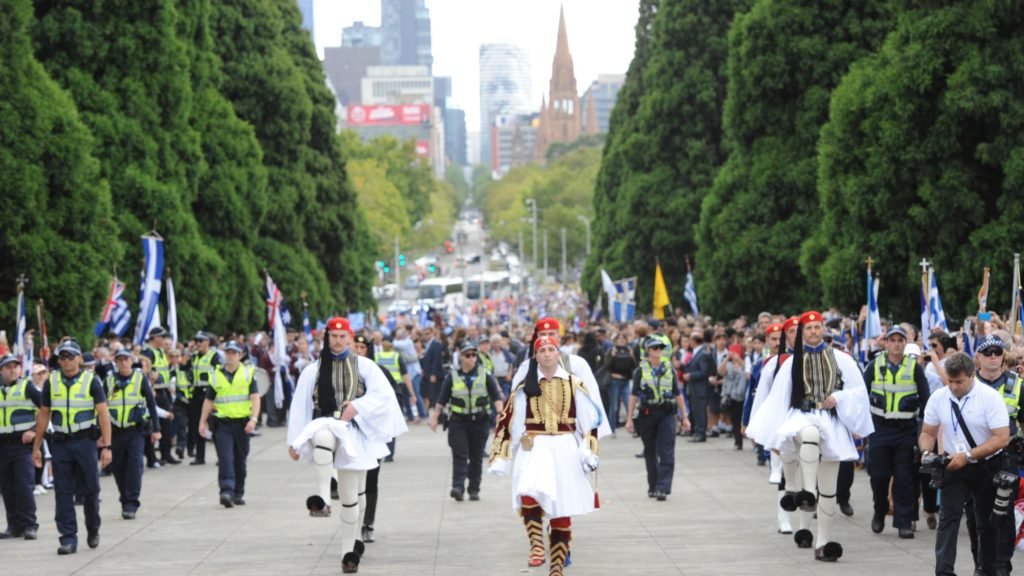
Greek National Day Celebrations in the US
Over 31 years as an American diplomat, I have seen the inspiration that our democracy provides to other countries, so it is inspiring to watch the United States further perfect its democracy by electing Kamala Harris as Vice President, the highest-ranking female elected official in U.S. history and the first African American and Asian American to hold that office. President Biden is a friend of Greece who knows this country and its people well. The President-elect’s national security team has broad experience in this region and is deeply committed to our transatlantic relationship.
Inspired by ancient Greece’s greatest thinkers and the experience of Athenian democracy, our nation’s founders drafted a Constitution seeking to create a “more perfect union.” They understood that every democracy is a work in progress, that the American experiment would follow a winding path, and that our citizens would be tested. But they also knew that together, as citizens committed to democratic traditions, supported by like-minded nations around the world, our union would persevere, bending ever closer to the ideals of liberty, equality, and justice for all.
On “USA & Greece: Celebrating 200 Years of Friendship” programs:
- thumbnail_Letter from Thomas Jefferson to Adamantios Korais, October
- Mr. Webster’s speech on the Greek Revolution, 1824_
- Letter from Thomas Jefferson to Adamantios Korais, October
We will partner with Greek civil society, cultural and educational institutions, cities, and individual citizens throughout the year on programs to celebrate our historic friendship. Starting with the history I was talking about, we’re going to have a program here, at the wonderful American School of Classical Studies, for an exhibition focused on the American Philhellenes. We’re supporting a new museum of philhellenes which will help to tell that story. We also have a program with the national opera and the orchestra focused on music from the period of the American Revolution.
But we’re also looking to the future. So we have programs, for instance, with the Athens Science Festival, looking back on 200 years of innovation, reminding people that this is a relationship that has very deep roots and, as I said, is really distinguished by these very strong people-to-people ties but also the values that unite our two countries.
- Virtual Entrepreneurship Project “Connect the Dots”: a virtual entrepreneurship mentoring program conducted in partnership with The Hellenic Initiative (THI), this program will provide online mentorship by U.S. business leaders to Greek entrepreneurs. This program is placed under the auspices of the “Greece 2021” Committee.
- Athens Science Festival 2021 – 200 Years of Innovation: an experiential space will be created, comprising multiple exhibits that refer to the historical anniversary and the evolution of the Greek state, highlighting areas of shared scientific excellence with the U.S. and featuring prominent American speakers. This program is placed under the auspices of the “Greece 2021” Committee.
- Greek National Opera, Stavros Niarchos Hall: the Greek National Opera will present two special musical performances of works reflecting the shared values of the U.S. and Greece.
- The “American Philhellenism” Exhibition at the Museum of Philhellenism: a special exhibition entitled “The American Philhellenism” at the Museum of Philhellenism in Athens, featuring unique artefacts and historical documents capturing the birth and evolution of Philhellenism, U.S. support for the Greek Revolution, and the impact of Greek culture on the values, institutions, artistic and architectural expressions in the U.S.
- Exhibition “The Free and the Brave: American Philhellenes and the Glorious Struggle of the Greeks (1776-1866):” at the Gennadius Library, American School of Classical Studies at Athens, this will be an exhibition exploring the movement of Philhellenism that flourished in the U.S. in the 19th Century, influenced by Greek classical thought and democratic ideals.
- American Studies: scholarships towards the establishment of an American Studies curriculum at a Greek university.
- “Greek Fire:” a seminar at the Delphi Economic Forum and online report on the lasting impact that the Greek Revolution has had on American culture and politics.
- City of Sparta: Sparta will host a conference on American Philhellenes and conduct a range of programs throughout 2021 to commemorate the bicentennial.
- U.S. Consulate General Thessaloniki: the creation of an exhibit that chronicles the history of the Consulate General and the U.S. presence in Thessaloniki.
- UCLA Stavros Niarchos Foundation Center for the Study of Hellenic Culture: an original work entitled “Makriyannis Unplugged” performed by Yorgos Karamihos at Cotsen Hall in the Gennadius Library, American School of Classical Studies at Athens.
Program dates and further details about specific programs will be provided on the U.S. Embassy website throughout the year at gr.usembassy.gov.

